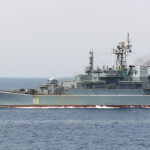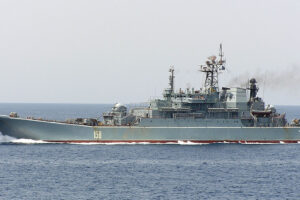Since Sudan erupted into a conflict in mid-April between the army and a paramilitary group, most international attention has focused on the intense battle for the capital, Khartoum. But the fighting has also spread in the western province of Darfur, a conflict-weary militarised region the size of France.
The unrest there, analysts warn, could destabilise neighbouring countries – in particular Chad – and reverberate across the wider Sahel region.
“The fighting in Darfur might impact the equilibrium between the different communities living across the border,” Remadji Hoinathy, an expert at the Institute of Security Studies, told Al Jazeera.
“If the fighting intensifies in Darfur, there is no way it won’t spread in Chad through the community dynamics,” he said.
The region has for decades been a source of tension between Arab and non-Arab communities over a number of reasons, including competition over land and water. With that conflict now reignited, the risk is that Darfur could become an epicentre for arms proliferation and returning fighters as reports say that both weapons and combatants from beyond Sudan’s borders have already entered the conflict between the army and the paramilitary Rapid Support Forces (RSF).
“Fighters crossing also means spreading weapons. Before this conflict, this was the zone where small arms were circulating overall,” Hoinathy said. “There is a possibility that if the war in Sudan finishes or if a solution is set, there will be a need to think about all those people who will be spreading arms in the region.”
https://imasdk.googleapis.com/js/core/bridge3.575.0_en.html#goog_1811789398Play Video
Video Duration 02 minutes 01 seconds02:01Hundreds reportedly killed in violence in Sudan’s West Darfur
The RSF was established a decade ago, evolving from the government-backed militia known as the Janjaweed, which is accused of atrocities in Darfur after war broke out there in 2003
In the years that followed its creation, it was bolstered by mainly Arab recruits from Chad (some estimates say as many as 7,000), many of whom joined its ranks to secure better pay.
Their presence in the conflict threatens to upset local peace drives and prolong fighting in Darfur, warned Hoinathy, noting that poverty and kinship have been the primary factors driving the migration of fighters.
RSF head Mohamed Hamdan “Hemedti” Dagalo has strong ethnic ties to communities in Chad. This, coupled with the RSF’s wealth (the group controls lucrative mines in gold-rich Sudan), spurs support for Hemedti among some locals.
Meanwhile, with reports emerging early on in Sudan’s crisis that Russian private military contractor Wagner Group was providing tactical support to the RSF, analysts said the possibility of Chad becoming a base for the Sudanese paramilitary group also promised to upset France. The former colonial power sees authorities in the Chadian capital, N’Djamena, as an essential partner to curtail both Kremlin influence and armed groups in the region.
“The prospect of Wagner’s support to RSF, not only will pose a threat to Chad’s France-backed military regime but will further risk mutating the conflict into a proxy war,” said Mucahid Durmaz, a senior analyst covering West Africa at the London-based risk analysis firm Verisk Maplecroft.
https://imasdk.googleapis.com/js/core/bridge3.575.0_en.html#goog_1152802409Play Video
Video Duration 02 minutes 55 seconds02:55Refugees flee conflict in Sudan to neighbouring Chad
After the fall of Libyan leader Muammar Gaddafi in 2011, ethnic Tuareg fighters who fought on his side returned to Mali to restart a rebellion against the national army. Hardline groups soon took root in the region, seizing key northern cities and threatening to capture the capital, Bamako.
This prompted France to launch a military operation in January 2013, which helped drive out the fighters. Still, the violence worsened in the years, spreading beyond Mali’s borders to Burkina Faso and Niger despite the presence of thousands of United Nations and French troops.
The failure to stem the violence has led to the rise of anti-French sentiment across the region. And while France has pulled its troops out of Mali and Burkina Faso due to public and political pressure in recent years, it remains a close partner of Chad’s government.
That relationship could be tested if Chad faced a similar fate as Mali did in 2012. Hoinathy said if Chadian fighters – armed and battle-tested in Sudan – returned home, there was a risk that it might lead to ethnic conflicts.
“From the experience in Darfur, [there] has been fighting within communities, and the extent of the violence has been so high. We can get back to this kind of situation [in Chad] if there are a lot of fighters who [end up heading] back to [their local] communities,” he said.
“It is a real danger, and the [Chadian] state knows very well that this might happen. [The crisis will depend] on how it will manage it. If [they don’t,] this will just add to the intercommunal conflicts we already have in Chad and in the borders with Sudan.”
https://imasdk.googleapis.com/js/core/bridge3.575.0_en.html#goog_819470996Play Video
Video Duration 01 minutes 11 seconds01:11Video posted on social media documents destruction in Sudan
Chad’s government has been alert, considering its complicated relationship with rebels in the country. In 2021, rebels from the Front for Change and Concord in Chad group crossed into the country from Libya in an anti-government offensive, which led to the death of longtime President Idriss Deby during a visit to front-line troops.
An influx of arms into Chad could also worsen already devastating conflicts elsewhere in West Africa, according to Durmaz.
“There is a fear, if Chad descends into chaos, of the entire Sahel region turning into a massive playground of militant groups driving insurgency by controlling lucrative smuggling routes,” he told Al Jazeera.
For instance, in Nigeria – which borders Chad in the north – the government is struggling with a complicated tripartite of armed groups, bandits and gunmen spread across the country.
“Chad is a direct corridor to Nigeria, and the disintegration of security in Sudan will generate flows of refugees and possibly fighters and arms out of Sudan with possible regional implications spreading down to Nigeria,” Nnamdi Obasi, senior adviser for Nigeria at the International Crisis Group, told Al Jazeera.
Durmaz said cooperation among West African states “is vital to curb insurgency but it has not been explored enough by states”.
He noted that countries in the region need to “increase information sharing, training of security and intelligence forces and cross-border military operations”.
Source: Aljazeera
















